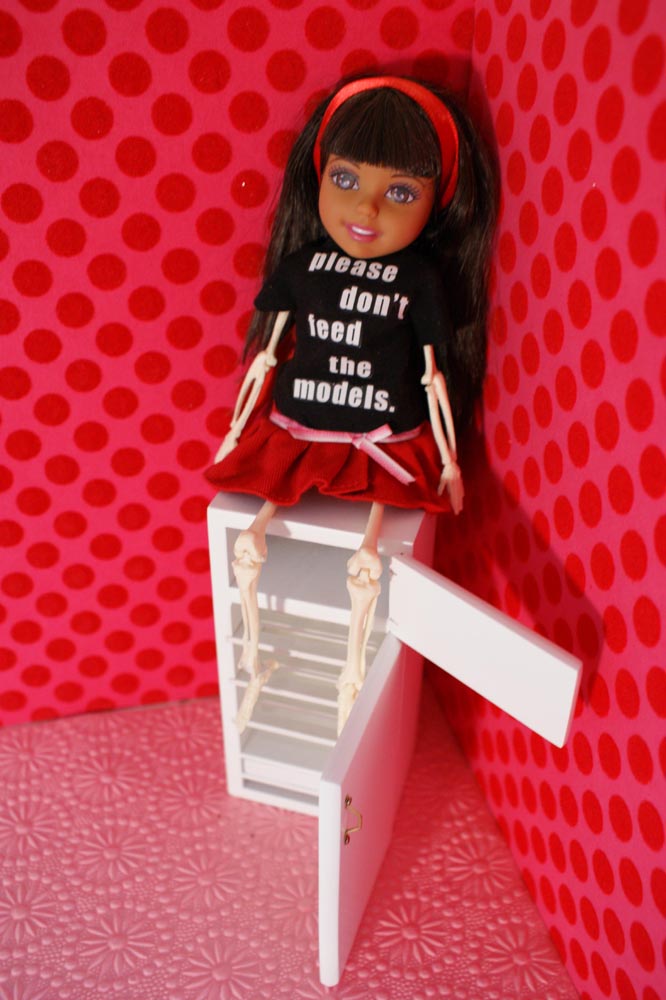My friends all looked at me and laughed. The woman at the microphone noticed, tried to get them to point me out, but they wouldn't give me up. And I had the wonderful thrill you can only get as a teenager who has gotten away with something.
Knowing me, I probably had my favorite plain bagels in a Ziploc bag in my backpack. If you're counting calories as religiously as I was, every single one of them had better be delicious. The food I liked was hard to come by, so when the cafeteria had it, I had to save it. My parents gave me money for food, but I would rather spend it on clothes that showed off how skinny I was. I was thrilled to find a pair of button-fly flares on the clearance rack at Express that had been marked a size 1/2. They may have actually been mislabeled, but to me, to be able to fit into that special pair of jeans was a requirement for my own self-worth and happiness. Being able to wear them meant that I was in control of something. My grades weren't as high as everyone thought they should be, but my jeans size was as low as I wanted it to be. And when I got a printout from my P.E. class that said my BMI was 17 and I was underweight, I was ecstatic.
Yes, that's right. I had an eating disorder for 9 years. But I am only just now talking about it on this blog, although I have told people who have asked about it in person when they've seen The Doll Project. Though I never reached the point of needing to be hospitalized, though I could "fly under the radar," though I found ways to hide it, I starved myself and submitted myself to punishing exercise regimes from the time I was 14 until I was 23. But I was embarrassed to talk about it because Black girls don't get eating disorders, right?
That's what some people say when they see the Black dolls in the pictures from The Doll Project. But that's why I chose to include them. Bulimia, not anorexia, is actually more common in Black girls as far as eating disorders go, statistically, but there are Black girls who restrict their food intake, too. I've been there, and along the way I even met other African-American girls who were doing the same thing, too.
This is my first post for National Eating Disorders Awareness Week 2014. All week long, I will be posting new images from The Doll Project and some videos I've been saving. Think of it as food for thought, as they are scheduled to be published around lunchtime, at 12 noon central time. I wanted to start out with this food for thought because it's something I have never shared before, and I wanted to. I'm planning to self-publish the Doll Project book this spring, but felt like I needed to say this here first. I want people to know that recovery is possible, and that there are Black folks who have had eating disorders. We aren't unicorns.
I want to end this post with a quote from an excellent article. And also, there's a great video from Black Folk Don't that I think you should see.
"As women of color, we often have two conflicts: trying to hold on to the traditions and expectations of our distinct cultures while trying to fit in with mainstream society, especially if the United States is not the country we were born in. When it comes to eating disorders, conflicting cultural standards for beauty and acceptance are the culprits. Your culture of origin may hold one set of standards for beauty; but when you are met with another set of standards altogether, this can complicate your personal experiences with trying to be a woman, a youth, as well as a person of color. You may have been fine with your full-figured body, which may be mostly desired in your culture. However, in mainstream society, you may find that being thin is better, while being curvy is bad. In an attempt to fit in more with mainstream society, you may consider changing your body shape by vomiting after every meal, over exercising, or even starving yourself, putting yourself into the misunderstood and often deadly world of eating disorders. You may be aware that what you are doing is not only unhealthy and is going against your cultural values, but you are conflicted because you want to 'fit in.'”from Breaking it Down: Eating Disorders and Young Women of Color
Black Folk Don't: Have Eating Disorders from NBPC on Vimeo.
related links:
Black girls have body issues too by Lola Adesioye
It’s Not Just White Girls by Jessica Bennett





No comments:
Post a Comment